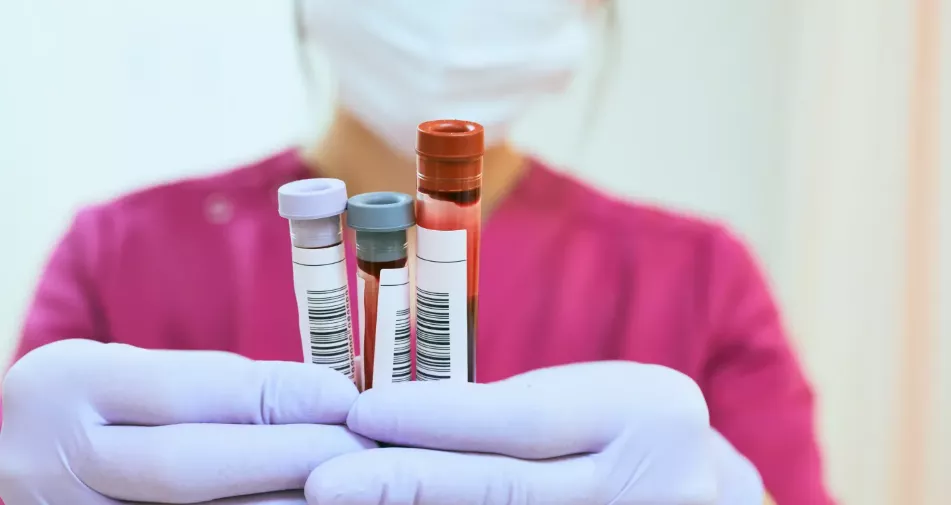As the monsoon drops in, people are deeply concerned about mosquito borne infections such as Dengue fever. Families dealing with dengue often worry about the fall in the platelet count caused by the disease. But, what does that really mean?
Platelets are blood cells that help stop bleeding which rush to the point of injury and form a plug to prevent blood loss through excessive bleeding. The dengue virus attacks the bone marrow and lowers the amount of platelets the body is capable of producing. The disease also destroys platelets more rapidly, leading to a condition known as thrombocytopenia.
Understanding how to support platelet recovery is essential. While there’s no magic cure, careful medical management and supportive care can make a real difference.
When Should You Worry About Platelet Counts?
Having a thorough understanding of the platelet count during dengue fever helps to implement the required measures. Here’s a clear breakdown:
- 150,000-450,000 per microlitre - This is what the normal platelet range looks like for healthy people. Individuals must monitor their platelet levels consistently to avoid complications.
- 50,000-150,000 per microlitre - Just because the number is low, doesn’t always mean the disease is very serious. Even so, a person should check their platelet count and consult nearby general physician
- Below 50,000 per microlitre - Such a low platelet count can indicate that the patient has severe dengue associated with bleeding risks and has to seek immediate medical attention to avoid life threatening complications.
By watching the counts carefully and following medical guidance, families can manage dengue fever safely and effectively.
What to Eat in Dengue to Increase Platelets?
Families often ask, what to eat in dengue to increase platelets? People should focus on eating healthy by incorporating specific nutrient-rich foods in their diet. Here are some examples:
- Vitamin C-rich foods: Amla, oranges, guava and lemons must be consumed to boost the immune system.
- Iron-rich foods: Spinach, lentils and beets help your body make red blood cells.
- Folate sources: If you have anaemia, you can eat papaya leaves (only with a doctor’s guidance), legumes and fortified cereals to help with blood formation.
- Hydration: Staying hydrated with coconut water, fresh juices and soups is important when you have dengue.
- Protein sources: Tissue repair is aided by including eggs, chicken broth and dairy in your meals.
These food options give your body the nutrition it needs. However, it is recommended to always use the diet plan prescribed by a healthcare expert to get the best results.
Why Rest and Monitoring Matter
Recovery from dengue is not just about what to eat in dengue to increase platelets. It also requires rest and close observation. The body needs energy to fight the virus. Overexertion can worsen weakness or lead to complications. Families should watch for warning signs, including:
- Bleeding gums or nose
- Black or tarry stools
- Sudden abdominal pain
- Difficulty breathing
If any of these symptoms appear, visit a general physician immediately. Early medical attention can prevent serious outcomes.
When Are Platelet Transfusions Needed?
Many people believe that any drop in the dengue fever platelet count requires a transfusion.
This is a myth. Doctors usually recommend transfusions only when platelet levels fall below 10,000 per microlitre or if active bleeding is present.
Unnecessary transfusions can cause complications like allergic reactions or infections. That’s why decisions are made carefully by experts, often those trained in internal medicine in India, who follow national and international guidelines.
How Can Families Support Recovery at Home?
Beyond hospital visits, home care plays an important role in dengue recovery. Here are simple but effective steps families can take:
- Ensure plenty of rest: Create a calm, quiet space for the patient.
- Maintain adequate hydration :
- Offer light, nutritious meals: Focus on small, frequent meals that are easy to digest.
- Track symptoms: Keep a daily record of fever, any rashes,gastrointestinal disturbances and watch for any signs of bleeding.
- Stay in touch with the doctor: Regular updates help guide treatment and prevent complications.
Busting Common Myths About Dengue
There’s a lot of misinformation about dengue. Let’s clear up a few myths:
- Papaya leaf extract is a cure: Some small studies suggest it may help, but it is not a replacement for medical treatment.
- Antibiotics help fight dengue: Dengue is a viral infection, so antibiotics are not effective.
- Only platelet count matters: Doctors look at the full clinical picture, not just one number.
Final Thoughts: Trusting Medical Advice
The best way to manage dengue fever platelet count is through regular monitoring and evidence-based care. While food, rest, hydration, and home support are essential, nothing replaces expert guidance.
Consulting a trusted general physician in India or seeking specialist advice in internal medicine at the earliest ensures that decisions are based on science, not fear. Families play an active role by providing supportive care, staying informed, and knowing when to seek help. Together, medical care and home support give patients the best chance of a smooth recovery.









